Saturday, May 12, 2007
This is what happens when you aren’t as transparent as Venezuela
Today the New York Times reported on the massive looting of the Iraqi oil industry. According to a U.S. government report anywhere between 2 and 5 billion dollars worth of Iraqi oil is unaccounted for.
This is on top of billions of dollars worth of refined products that go missing each year:
Now, given that oil production numbers can be disputed some times I decided to go to the source and see what the Iraq State Oil Company had to say about this. Thing is, I couldn’t even find any web site for them. Actually, the Iraqi oil company is split by geographic region such that there is a “Northern Oil Company” and a “Southern Oil Company”. But I couldn’t find them either.
Next I tried looking up the Iraq Oil Ministry. Couldn’t find it either. I guess I should think of an award to give any reader who manages to find any official Iraqi oil industry site.
Of course, Venezuelans who want to learn about the status of their oil industry have no such problem. They can find comprehensive financial statements here. Their State oil company, PDVSA, has a very comprehensive and informative web site here. And they file audited financial statements filed with the U.S. Securities & Exchange Commission which are found here. Because Venezuela's oil industry is so transparent Venezuelans can get all sorts of data on how much oil their country has, how much it produces, how much it refines, who it sells it to, how much income it gets from those sales, how much it invests and on and on. Iraqis who want to know what is going on with their oil industry can only look on in envy.
There is one more interesting twist to this:
So they don’t have meters on the well heads to measure how much oil is being produced! Almost makes it seem that the old PDVSA managers that Chavez fired might be running the Iraqi industry. When the old PDVSA managers came to power in the early 1990s they took two measure to make it impossible for the government to track what they they were doing – they had Venezuelan tax authority auditors thrown out of PDVSA headquarters and they had the oil flow meters removed from the well heads.
Fortunately for Venezuelans those managers were fired, those decisions to reverse transparency reversed, and the Venezuelan government once again has full control over its oil industry. Iraqis can only wonder when they will be so lucky. Apparently having the United States invade and take over your oil industry isn’t all its cracked up to be.
|
Between 100,000 and 300,000 barrels a day of Iraq’s declared oil production over the past four years is unaccounted for and could have been siphoned off through corruption or smuggling, according to a draft American government report.
Using an average of $50 a barrel, the report said the discrepancy was valued at $5 million to $15 million daily.
The report does not give a final conclusion on what happened to the missing fraction of the roughly two million barrels pumped by Iraq each day, but the findings are sure to reinforce longstanding suspicions that smugglers, insurgents and corrupt officials control significant parts of the country’s oil industry.
This is on top of billions of dollars worth of refined products that go missing each year:
Iraqi and American officials have previously said that smuggling of refined products like gasoline and kerosene is probably costing Iraq billions of dollars a year in lost revenues. The smuggling of those products is particularly feared because officials believe that a large fraction of the proceeds go to insurgent groups.
Now, given that oil production numbers can be disputed some times I decided to go to the source and see what the Iraq State Oil Company had to say about this. Thing is, I couldn’t even find any web site for them. Actually, the Iraqi oil company is split by geographic region such that there is a “Northern Oil Company” and a “Southern Oil Company”. But I couldn’t find them either.
Next I tried looking up the Iraq Oil Ministry. Couldn’t find it either. I guess I should think of an award to give any reader who manages to find any official Iraqi oil industry site.
Of course, Venezuelans who want to learn about the status of their oil industry have no such problem. They can find comprehensive financial statements here. Their State oil company, PDVSA, has a very comprehensive and informative web site here. And they file audited financial statements filed with the U.S. Securities & Exchange Commission which are found here. Because Venezuela's oil industry is so transparent Venezuelans can get all sorts of data on how much oil their country has, how much it produces, how much it refines, who it sells it to, how much income it gets from those sales, how much it invests and on and on. Iraqis who want to know what is going on with their oil industry can only look on in envy.
There is one more interesting twist to this:
Mr. Ebel said the lack of modern metering equipment, or measuring devices, at Iraq’s wellheads made it especially difficult to track smuggling there. The State Department official agreed that there were no meters at the wellheads, but said that Iraq’s Oil Ministry had signed a contract with Shell Oil to study the possibility of putting in the meters.
The official added that an American-financed project to install meters on Iraq’s main oil platform in the Persian Gulf was scheduled to be completed this month.
So they don’t have meters on the well heads to measure how much oil is being produced! Almost makes it seem that the old PDVSA managers that Chavez fired might be running the Iraqi industry. When the old PDVSA managers came to power in the early 1990s they took two measure to make it impossible for the government to track what they they were doing – they had Venezuelan tax authority auditors thrown out of PDVSA headquarters and they had the oil flow meters removed from the well heads.
Fortunately for Venezuelans those managers were fired, those decisions to reverse transparency reversed, and the Venezuelan government once again has full control over its oil industry. Iraqis can only wonder when they will be so lucky. Apparently having the United States invade and take over your oil industry isn’t all its cracked up to be.
|
Like mushrooms after a spring rain
I have neglected the Venezuelan housing situation for a little while now. That is a shame because new subsidized housing is springing up around Venezuela like mushrooms after a spring rain.
For many years housing was a weak point for the government. Yes it always constructed first rate housing – Chavez refused to construct the plastic walled, tin roofed junk previous governments called homes – but it consistently failed build the large quantities that Venezuela needs. Part of the responsibility for that was disorganization and incompetence within the government and part things like the devastating opposition led oil strike not exactly being helpful.
Yet that has now been all turned around. Last year the Venezuela government built a record number of new homes.
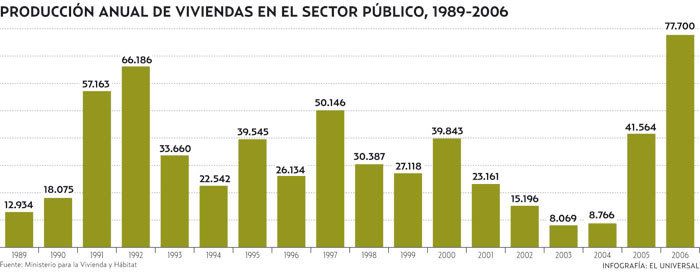
Combine that with their very high quality (those not familiar with what these homes are like should review this inside look at public housing in Venezuela) and clearly the housing sector is now running on all cylinders and is a big plus for the government. [as an interesting aside, you could tell the housing situation was now turned around just from noting how the opposition media practically stopped talking about it]
Given all this I thought now would be an appropriate time to look at some of the new housing going up as we speak. Apologies in advance for any bandwidth problems.
Note most of these homes are being built in Miranda state. But they are representative of what is happening all around Venezuela:
Zamora
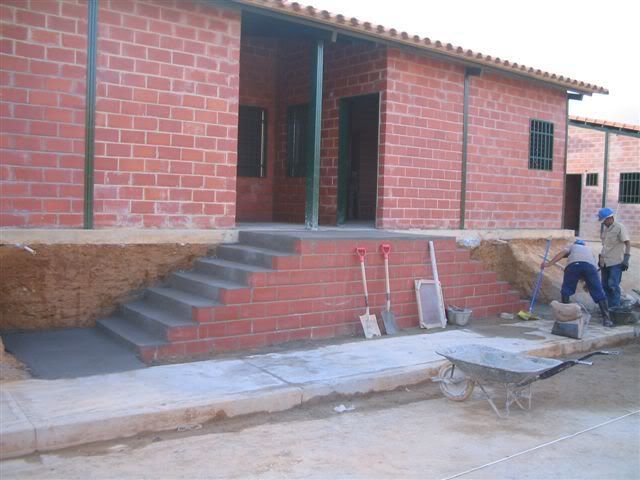
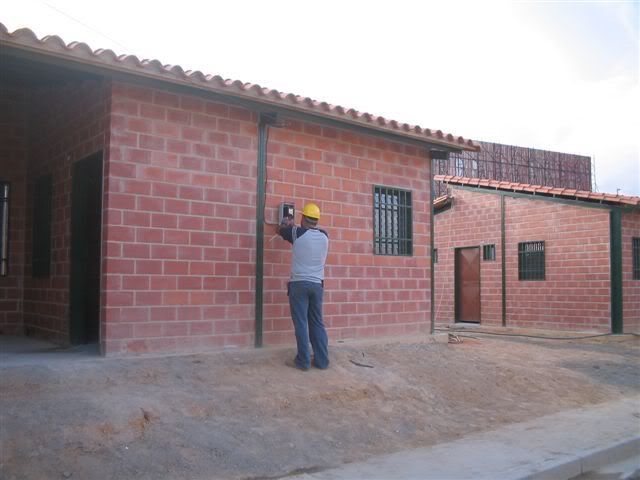
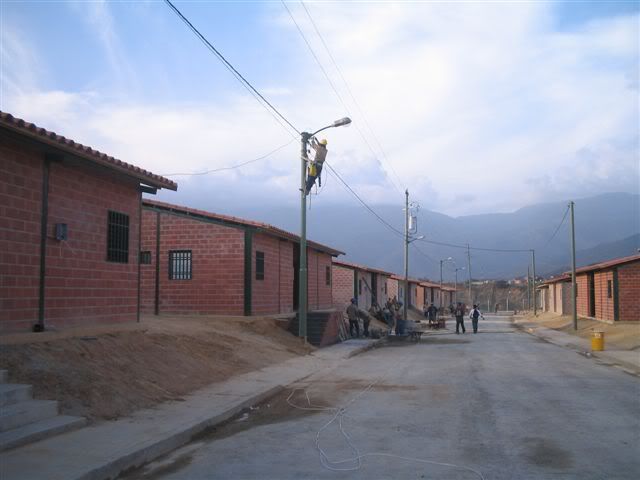
Santa Sofia
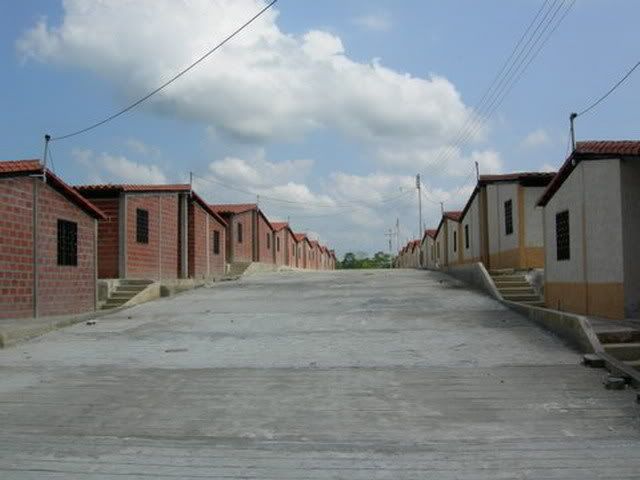
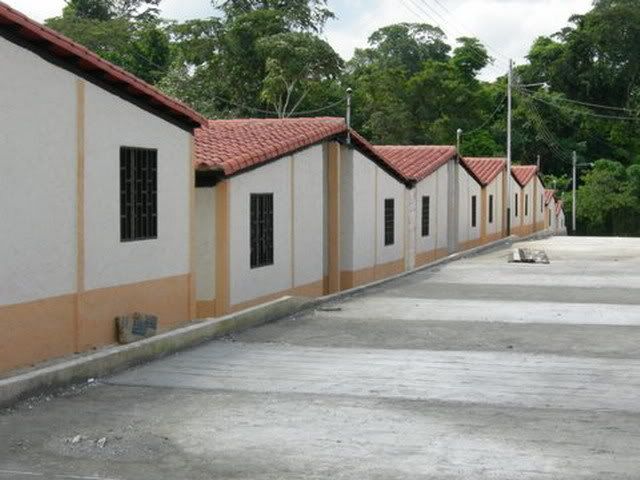
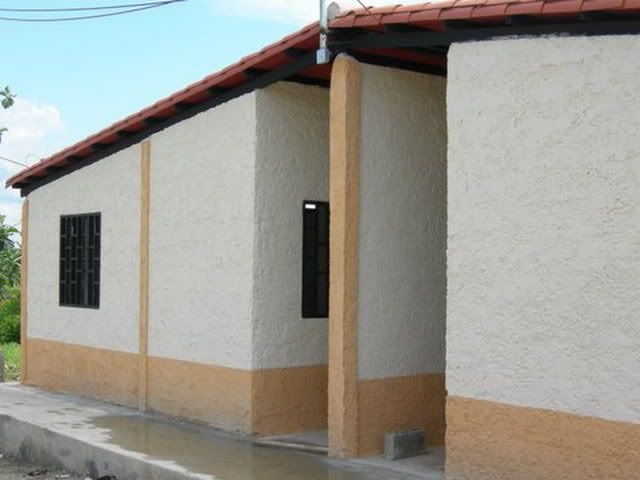
Independencia
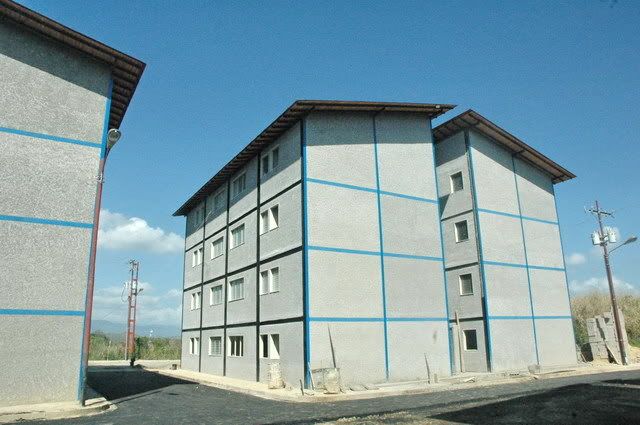
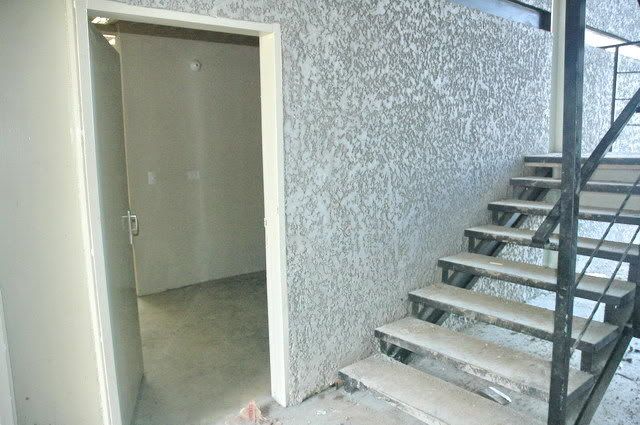
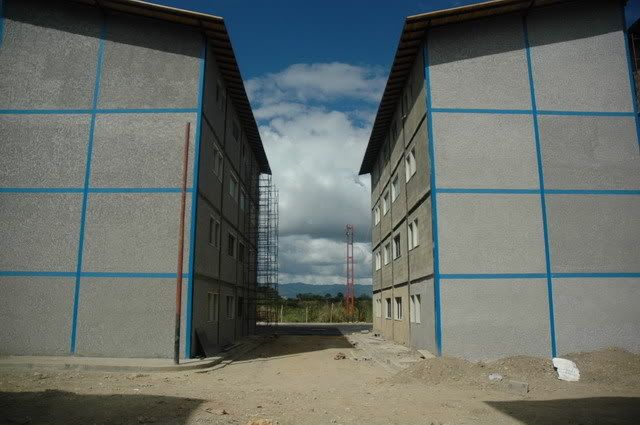
Valles del Tuy
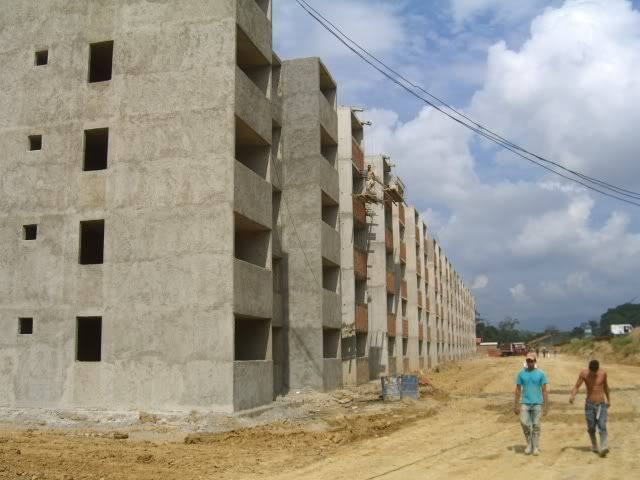
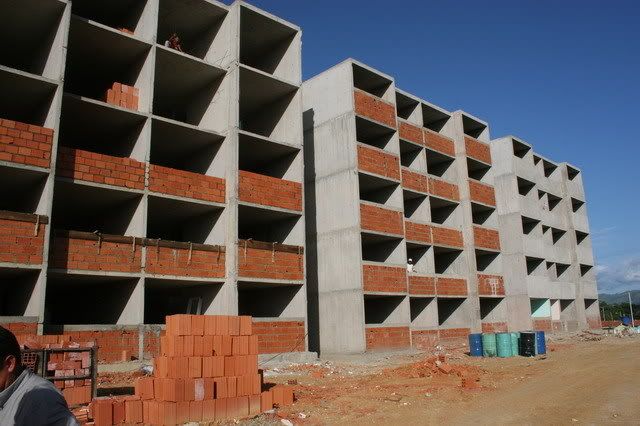
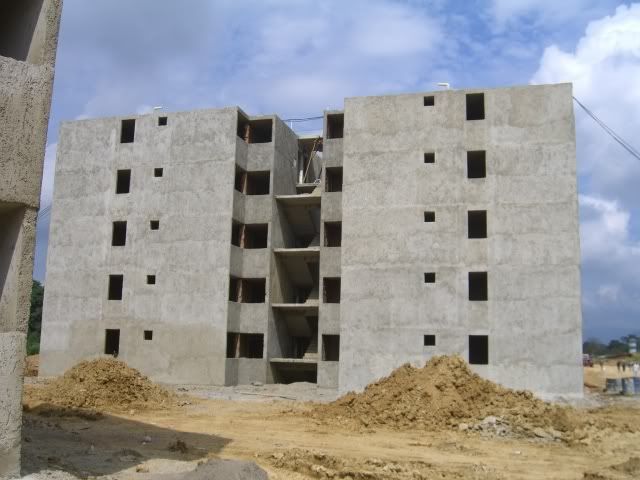
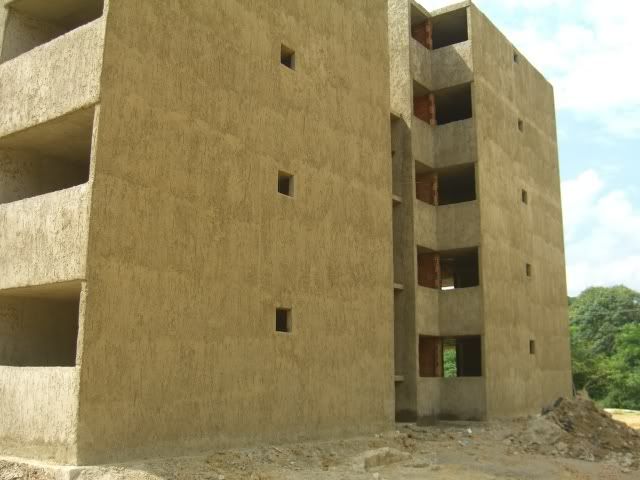
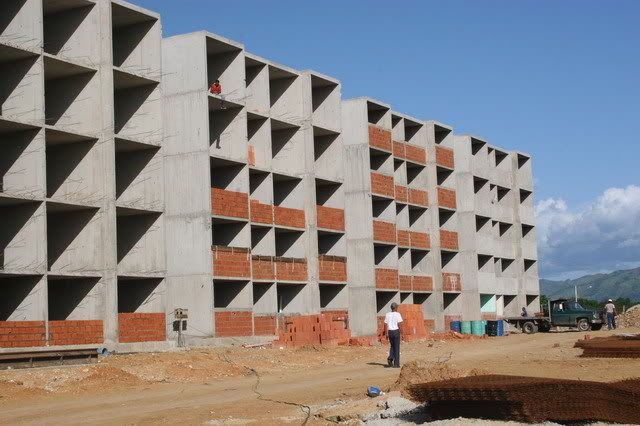
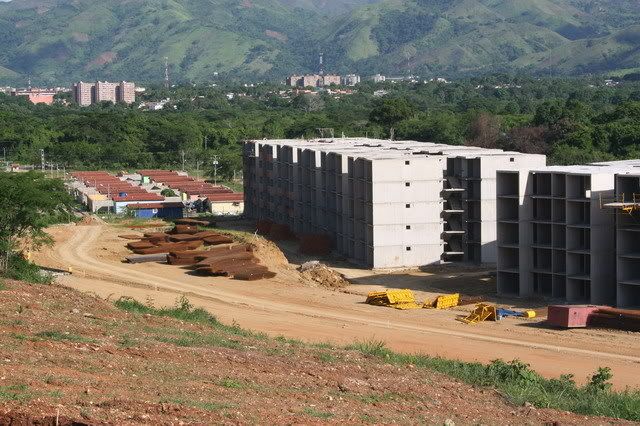
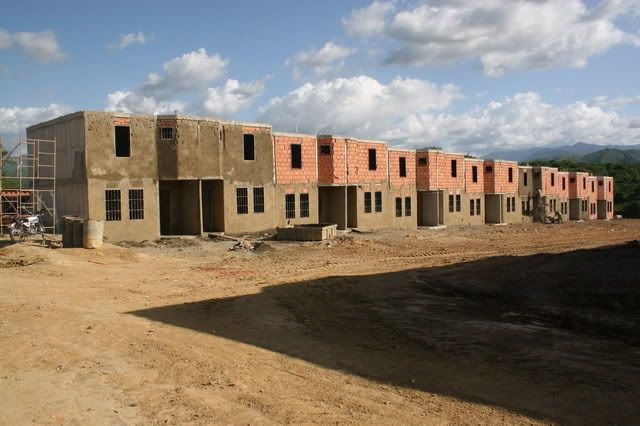
Eulaia Buroz
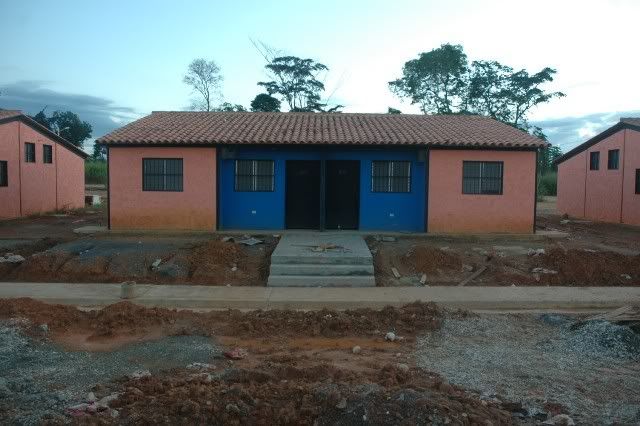
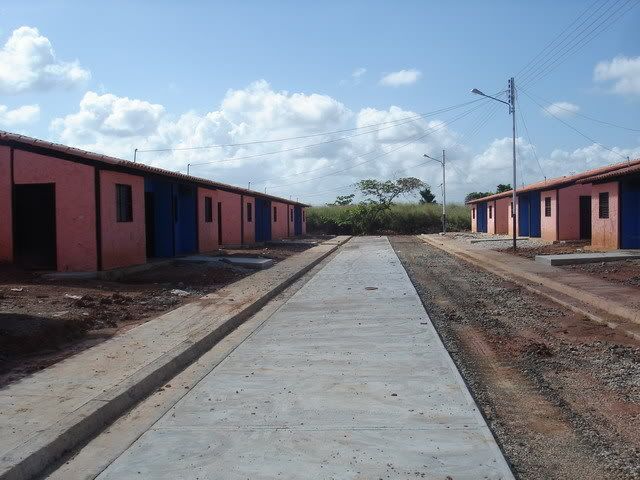
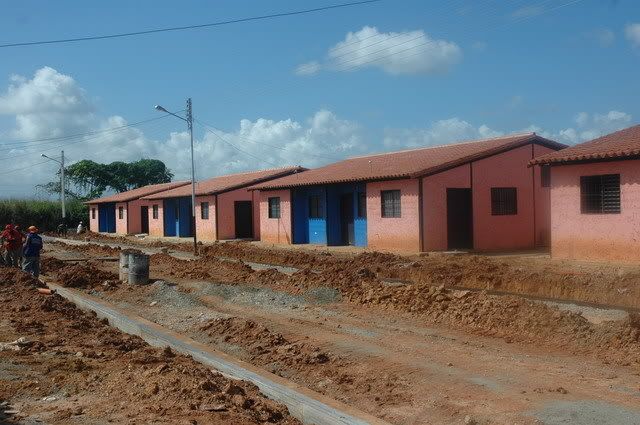
Cristobal Rojas
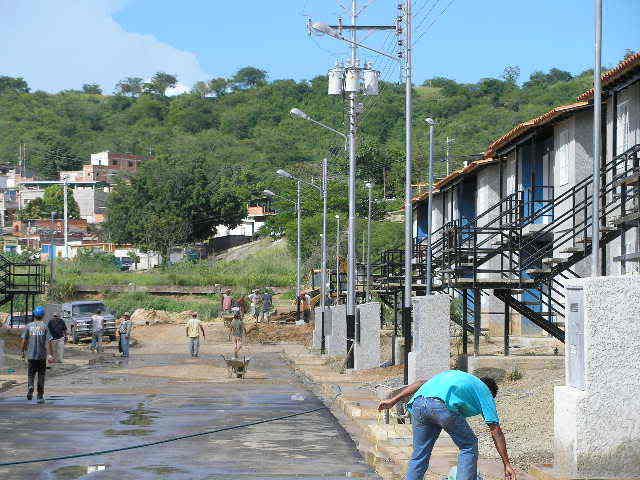
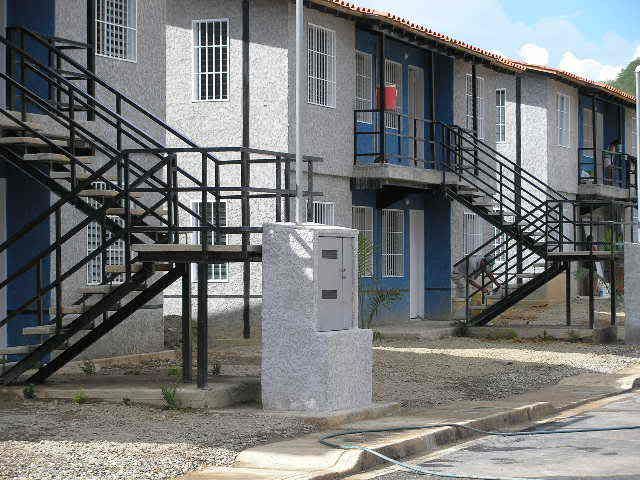
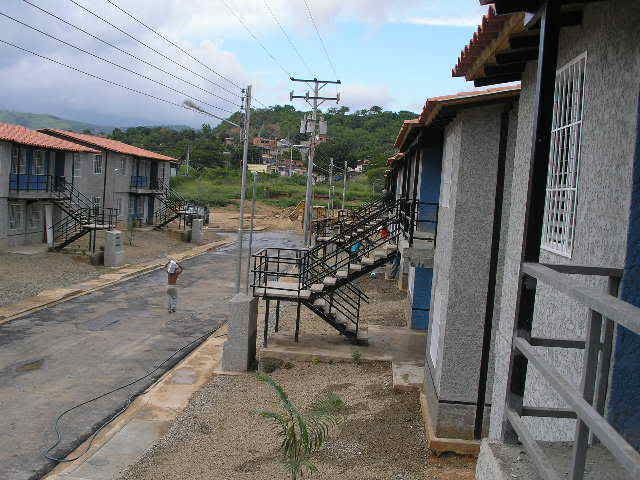
Chavari
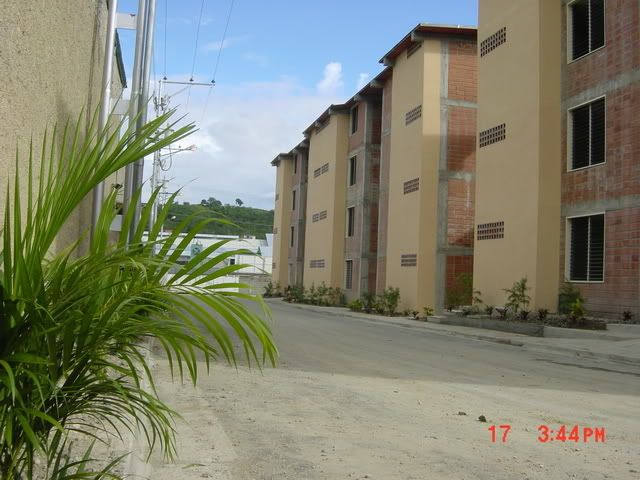
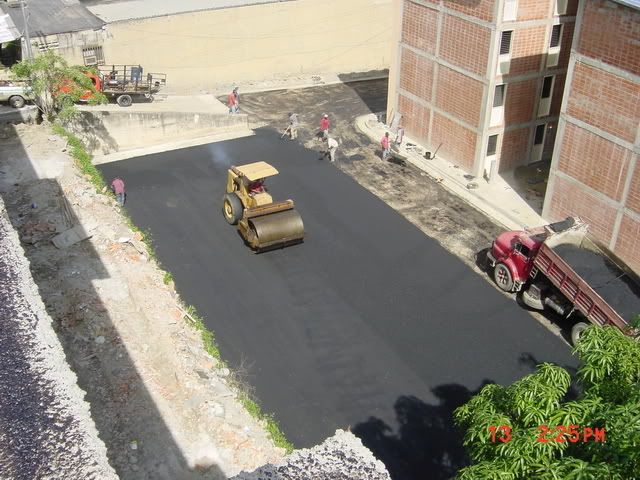
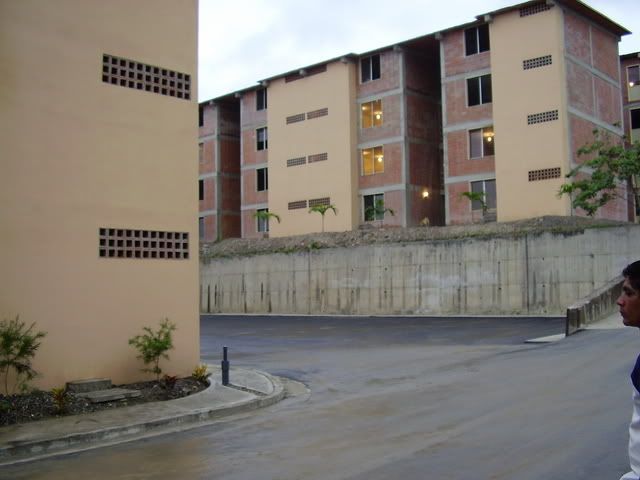
Calabaza
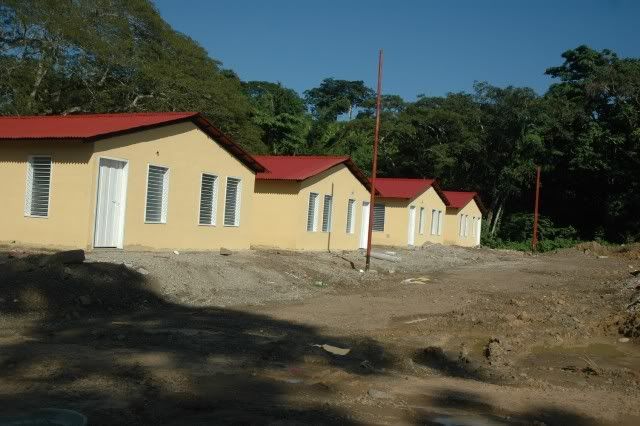
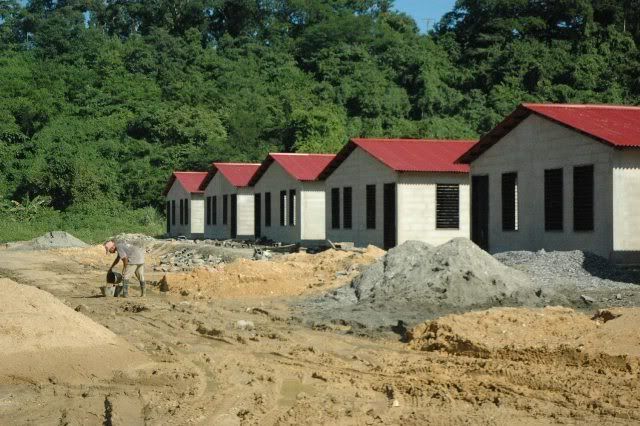
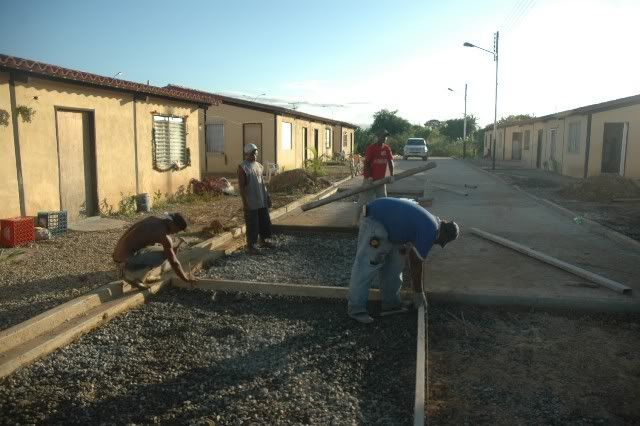
Brion
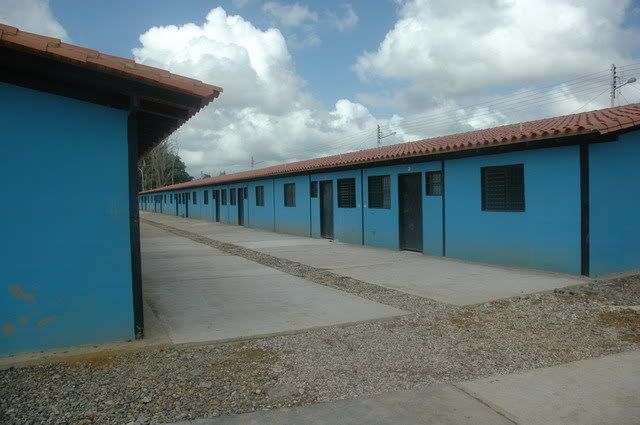
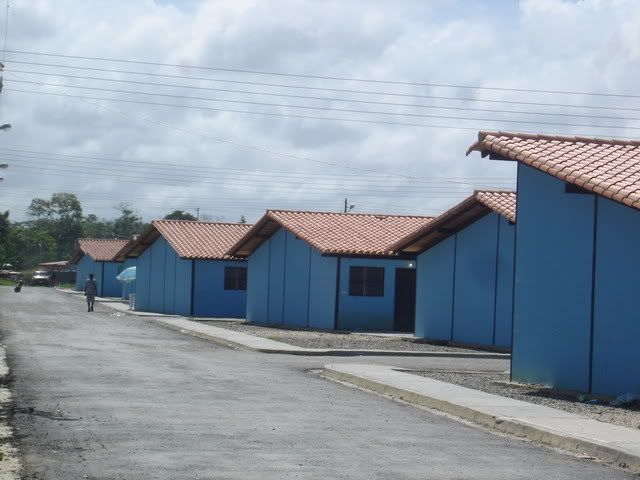
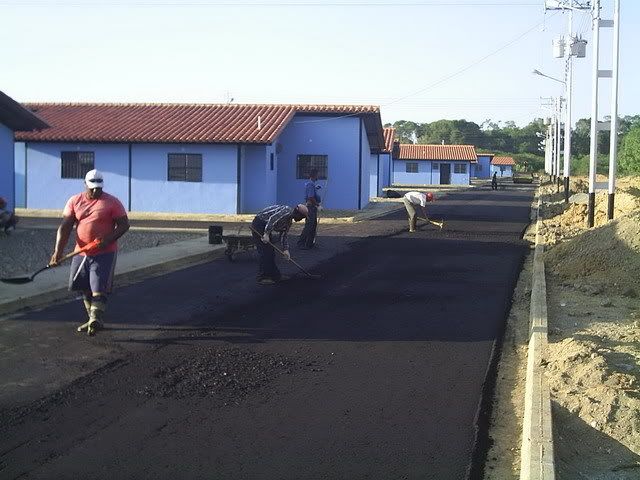
Paez
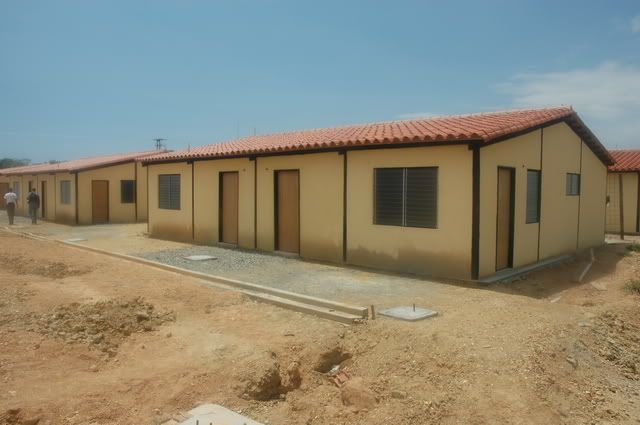
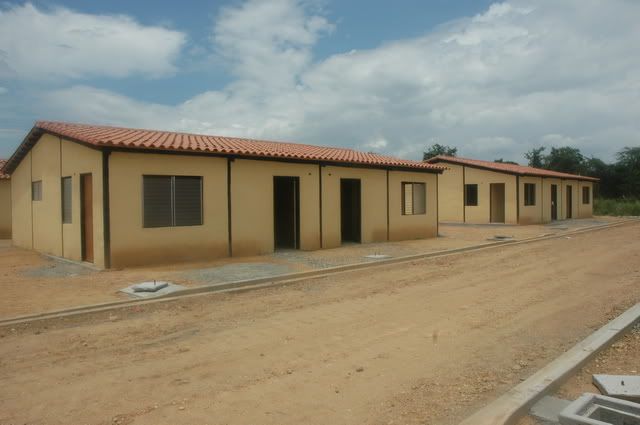
And here are some of the inhabitants of all this new housing. I bet they look kind of scary to your average escualido – they could be Chavistas

As can be seen, while the opposition bitches, moans, and whines Venezuela keeps moving ahead and offering a better life for its citizens day after day.
Oh, by the way, the ugly head of shortages manages to pop up even in this otherwise happy picture. You see, consumption of cement is up over 20% so far this year do to the massive public works projects going on throughout the country. So far there haven’t been any shortages. But in case demand keeps increasing at this level they’ve already made plans to start importing cement from Cuba.
|
For many years housing was a weak point for the government. Yes it always constructed first rate housing – Chavez refused to construct the plastic walled, tin roofed junk previous governments called homes – but it consistently failed build the large quantities that Venezuela needs. Part of the responsibility for that was disorganization and incompetence within the government and part things like the devastating opposition led oil strike not exactly being helpful.
Yet that has now been all turned around. Last year the Venezuela government built a record number of new homes.

Combine that with their very high quality (those not familiar with what these homes are like should review this inside look at public housing in Venezuela) and clearly the housing sector is now running on all cylinders and is a big plus for the government. [as an interesting aside, you could tell the housing situation was now turned around just from noting how the opposition media practically stopped talking about it]
Given all this I thought now would be an appropriate time to look at some of the new housing going up as we speak. Apologies in advance for any bandwidth problems.
Note most of these homes are being built in Miranda state. But they are representative of what is happening all around Venezuela:
Zamora



Santa Sofia



Independencia



Valles del Tuy







Eulaia Buroz



Cristobal Rojas



Chavari



Calabaza



Brion



Paez


And here are some of the inhabitants of all this new housing. I bet they look kind of scary to your average escualido – they could be Chavistas

As can be seen, while the opposition bitches, moans, and whines Venezuela keeps moving ahead and offering a better life for its citizens day after day.
Oh, by the way, the ugly head of shortages manages to pop up even in this otherwise happy picture. You see, consumption of cement is up over 20% so far this year do to the massive public works projects going on throughout the country. So far there haven’t been any shortages. But in case demand keeps increasing at this level they’ve already made plans to start importing cement from Cuba.
|
Thursday, May 10, 2007
The decisions just keep getting more and more "erratic"
Today one of the final pieces of Chavez's totalitarian project fell into place. The right to smoke where one pleases has been infringed in the ultimate act of Castro-Communism government control.
According to Venezuelan Health Minister Erick Rodriguez all smoking will be banned in restaraunts effective May 31.
It is one thing to mess with Big Oil, Exxon, Shell, and Conoco are all a bunch of wimps anyways. But now Chavez is messing with Big Tobacco.
Right now in Venezuela there is literally nothing but Phillip-Morris standing between the right to give yourself and everyone else around you lung cancer and eternal slavery in a non-smoking hell. At the very least hopefully we can count on the New York Times to denounce this autocratic and "erratic" decision.
|
According to Venezuelan Health Minister Erick Rodriguez all smoking will be banned in restaraunts effective May 31.
It is one thing to mess with Big Oil, Exxon, Shell, and Conoco are all a bunch of wimps anyways. But now Chavez is messing with Big Tobacco.
Right now in Venezuela there is literally nothing but Phillip-Morris standing between the right to give yourself and everyone else around you lung cancer and eternal slavery in a non-smoking hell. At the very least hopefully we can count on the New York Times to denounce this autocratic and "erratic" decision.
|
Just reporting the news…or creating it.
Both the RCTV case and the issue of political persecution have been topical recently. So I thought it might be good to do a short post that touches both.
Most readers will recall that between December 2002 and February 2003 the Venezuelan opposition, true to its anti-democratic form, went on a “strike” to topple the elected government. By shutting down the state oil company and locking out employees from their places of work they hoped to make it impossible for people to earn a living and literally starve them into submission.
Of course, given that not everyone supported this strike some people had to be forced. Oil workers who continued to work had people banging on post and pans outside their homes all night. Stores and restaurants that dared open had their windows smashed and their shops ransacked. Tax and bus drivers who continued to transport people were had their windshields smashed with rocks; or worse:
This bus driver had his bus set on fire – with him in it!!!
Now, as bad as the opposition thugishness is, which is expected at this point, note the curious behavior of our friends from RCTV.
The reporter on the scene is all excited – but not about whether or not the driver is ok. No, what she asks again, and again is “why did they burn your bus, is it because you were working?”
Certainly not very subtle is it? People are getting set on fire for going to work – HINT, HINT, HINT – go to work and you too may get set on fire!!
Of course, this is not at all exceptional for that time period. RCTV actively participated in the strike, refused to show normal broadcasting or advertising, and instead ran slick ad after ad calling on people to participate in the strike and overthrow the government. RCTV were not bystanders observing and reporting events – they were active participants.
Sure it is much less blatant than during the coup when they had their broadcasts used to actually direct the coup. Nevertheless, it is still pretty obvious.
And then people wonder why the government telecommunications agency would think it a good idea now to have RCTV broadcasting over the public airwaves!!
|
Most readers will recall that between December 2002 and February 2003 the Venezuelan opposition, true to its anti-democratic form, went on a “strike” to topple the elected government. By shutting down the state oil company and locking out employees from their places of work they hoped to make it impossible for people to earn a living and literally starve them into submission.
Of course, given that not everyone supported this strike some people had to be forced. Oil workers who continued to work had people banging on post and pans outside their homes all night. Stores and restaurants that dared open had their windows smashed and their shops ransacked. Tax and bus drivers who continued to transport people were had their windshields smashed with rocks; or worse:
This bus driver had his bus set on fire – with him in it!!!
Now, as bad as the opposition thugishness is, which is expected at this point, note the curious behavior of our friends from RCTV.
The reporter on the scene is all excited – but not about whether or not the driver is ok. No, what she asks again, and again is “why did they burn your bus, is it because you were working?”
Certainly not very subtle is it? People are getting set on fire for going to work – HINT, HINT, HINT – go to work and you too may get set on fire!!
Of course, this is not at all exceptional for that time period. RCTV actively participated in the strike, refused to show normal broadcasting or advertising, and instead ran slick ad after ad calling on people to participate in the strike and overthrow the government. RCTV were not bystanders observing and reporting events – they were active participants.
Sure it is much less blatant than during the coup when they had their broadcasts used to actually direct the coup. Nevertheless, it is still pretty obvious.
And then people wonder why the government telecommunications agency would think it a good idea now to have RCTV broadcasting over the public airwaves!!
|
Wednesday, May 09, 2007
Buying votes the old fashioned way...
As we saw some time ago the poor in Venezuela have done quite well under Chavez. Last year alone their REAL income was up 27% and since 2003 it is up 130%. Simply staggering numbers that represent an extremely impressive improvement in peoples lives.
Today we get news that everyone in general seems to be doing well. According to the I.N.E. the average income across the board in Venezuela last year was up 34.7%. In real terms that would be an increase of 15%. Makes perfect sense, the poor have fared much better than most people under Chavez - but most everyone has done ok
Kind of interesting how the official statistics jive with what private firms like AC Nielsen showing that real income, after inflation, is WAY up. So maybe the government numbers aren't all made up. Maybe Venezuelans really are living much better. And maybe that explains why they seem to like this Chavez character.
Just a theory.
|
Today we get news that everyone in general seems to be doing well. According to the I.N.E. the average income across the board in Venezuela last year was up 34.7%. In real terms that would be an increase of 15%. Makes perfect sense, the poor have fared much better than most people under Chavez - but most everyone has done ok
Kind of interesting how the official statistics jive with what private firms like AC Nielsen showing that real income, after inflation, is WAY up. So maybe the government numbers aren't all made up. Maybe Venezuelans really are living much better. And maybe that explains why they seem to like this Chavez character.
Just a theory.
|
Monday, May 07, 2007
Would you put up with this?
Today it was reported automobile sales in Venezuela were up another almost 98% in the first four months of this year. Between January and April of 2007 130,956 cars were sold in Venezuela versus 66,262 during the same period last year.
Great. With morning commutes that look like this in Caracas:
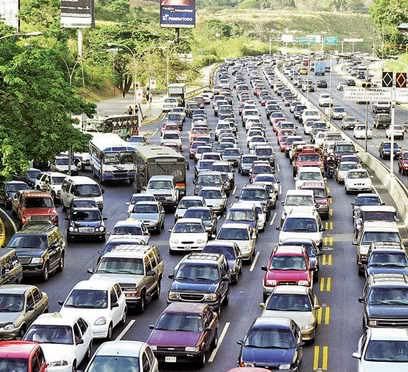
the last thing Venezuela would seem to need is a few hundred thousand more cars cluttering up its roadways. As if it wasn't bad enough a couple of years ago. Really, who would put up with this non-sense?
Fortunately Venezuelans won't be putting up with it much longer no matter how many new cars get sold.
First, brand new highways have popped up all over the place. Take a look at just a few examples:
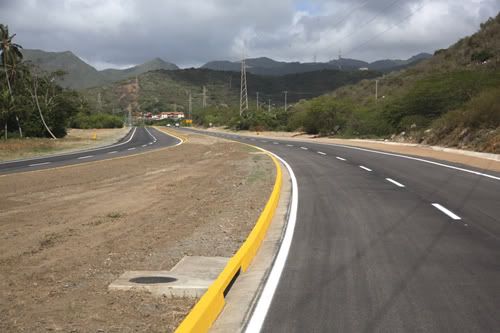
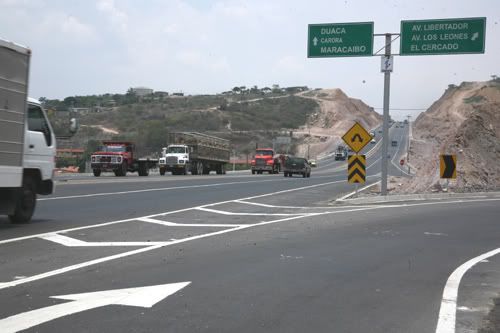

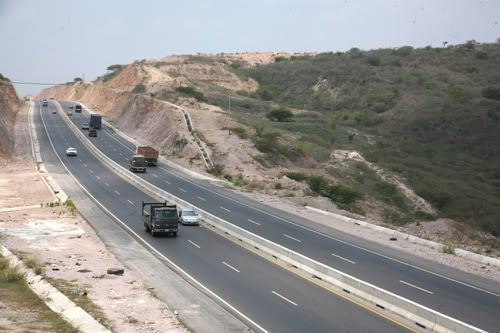
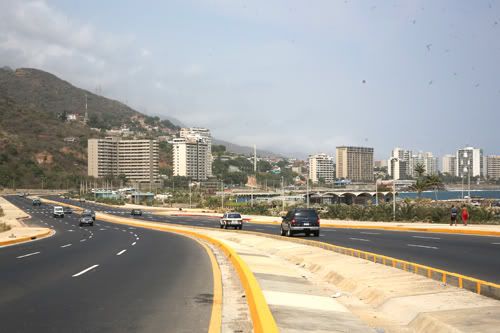
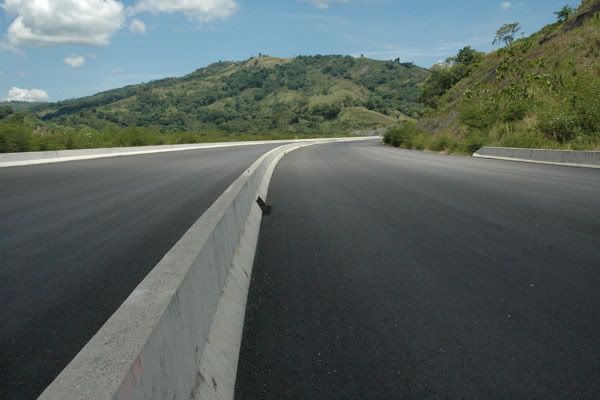

And if that weren't enough, hundreds of miles of additional roadways are in full construction:
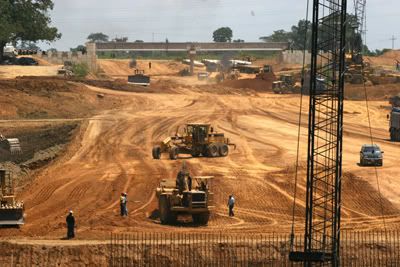
Of course, all the new gas guzzlers and new highways are hardly the best way to meet Venezuelas transportation needs. Recognizing that the Venezuelan government has three subway lines currently under construction in Caracas alone, one new commuter rail line about to begin construction, and more than 600 miles of intercity passenger rail under construction.
With the Venezuelan economy full speed ahead for the moment soon it will also be full speed ahead on its highways and railways.
|
Great. With morning commutes that look like this in Caracas:

the last thing Venezuela would seem to need is a few hundred thousand more cars cluttering up its roadways. As if it wasn't bad enough a couple of years ago. Really, who would put up with this non-sense?
Fortunately Venezuelans won't be putting up with it much longer no matter how many new cars get sold.
First, brand new highways have popped up all over the place. Take a look at just a few examples:







And if that weren't enough, hundreds of miles of additional roadways are in full construction:

Of course, all the new gas guzzlers and new highways are hardly the best way to meet Venezuelas transportation needs. Recognizing that the Venezuelan government has three subway lines currently under construction in Caracas alone, one new commuter rail line about to begin construction, and more than 600 miles of intercity passenger rail under construction.
With the Venezuelan economy full speed ahead for the moment soon it will also be full speed ahead on its highways and railways.
|
Sunday, May 06, 2007
If not now, when?
As is well known the Venezuelan economy has been doing phenomenally well over the past few years on the back of high oil prices. Virtually every economic indicator is positive and Venezuelan’s are living much better than they did just a few years ago.
However, it needs to be kept in mind that Venezuela is still an underdeveloped and poor country. Most Venezuelans have a low standard of living and there is a significant percentage living in poverty. The Venezuelan economy would probably have to grow another 300% or more before most Venezuelans would enjoy what most of us would consider a good standard of living. Given that to date under Chavez the economy has grown a cumulative 25% or 30% we can see Venezuela has a long, long ways to go.
Further, if Venezuela is to make further gains the next stage of its development will be different from what has occurred up to this point. Venezuela’s economic improvements during the first eight years of Chavez’s rule have come from 1) a successful policy of supporting OPEC and helping to maximize oil revenues and 2) a more equitable distribution of Venezuela’s wealth.
As successful as this line of development has been it has likely reached its maximum extent. That is, while these gains in Venezuela’s standard of living can hopefully be held on to it is unlikely, in my view, that Venezuela’s standard of living can be improved much more by simply selling natural resources. All of Venezuela’s oil income currently comes to little more than $5 per person per day – hardly what most people would want to live on. The prospect of oil going up still more in price such that the $5 would become even $10 is probably dim – and in any event it certainly isn’t something that can be counted on.
This leads to the uncontroversial point that Venezuela needs to move beyond selling oil and greatly expand other types of exports. For Venezuelans to ever have a decent standard of living in addition to exporting $50 billion worth of oil they also need to be also exporting a hundred or two hundred billion dollars of other goods.
I say this is an uncontroversial point because most everyone across the political spectrum, from the opposition to Chavistas, recognizes it. Yet, as much as this may be recognized and paid lip service to by everyone no-one has been successful in increasing non-oil exports – and Chavez is no exception to this poor performance.
This is illustrated by the following graph of non-oil exports:
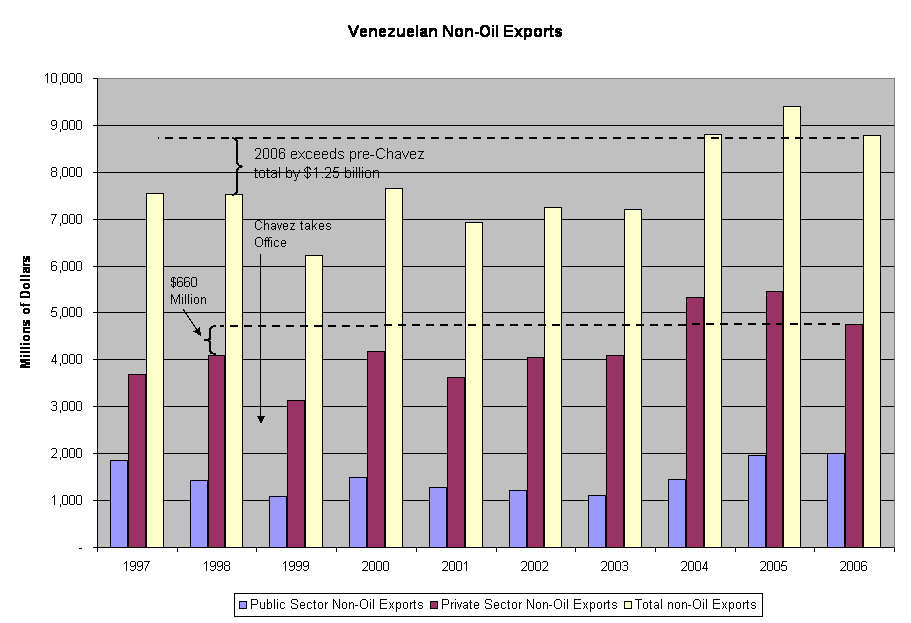
The tan bars show total Venezuelan non-oil exports. What is notable is that they haven’t changed very much over time. They were about $7.5 billion before Chavez came to office and they were about $8.75 billion last year (as a frame of reference oil exports last year were $58 billion). In relation to the size of the economy and Venezuela’s population this is almost unchanged. The blue bars show the portion of the non-oil exports that are by government owned industries and the red bars show non-oil exports by private industry.
If Chavez has had as his goal increasing non-oil exports he certainly hasn’t been very successful. [Parenthetically, it should be noted that the opposition did no better and that their whining about Venezuela being so heavily dependant on oil revenues is just cheap propaganda]. The question is why have non-oil exports been stagnant?
There is more than one reason why but among the most important, if not THE most important, is that Venezuela has historically kept its currency very overvalued. Its oil revenues have allowed it to keep its exchange rate fixed at a high level and this adversely effects most non-oil industries in a phenomena known as the Dutch Disease.
Why does having an overvalued currency hurt exports and domestic industry in general? Simple. It makes imports cheaper so that Venezuelans will tend to purchase more foreign goods than domestic ones. If 2,000 Bolivares buys a dollar then a $50 imported pair of jeans will cost 100,000 Bolivares. If a lot of Venezuelan’s have 100,000 bolivares to spend on jeans then they may well buy the imported pair. However, if it takes 4,000 Bolivares to get a dollar (from the Bolivar being devalued) that same pair of jeans will then cost 200,000 Bolivares which will lead to fewer Venezuelans wanting imported jeans. They will instead find Venezuelan made jeans cheaper and will be more likely to buy them.
The same goes for exports - the less valuable the Bolivar is relative to the dollar the cheaper Venezuelan goods will be to people in other countries and this will serve to boost Venezuelan exports.
Knowing that a strong currency tends to increase imports and stymie exports we can now look at a graph that will speak to why Venezuelan non-oil exports haven’t grown:
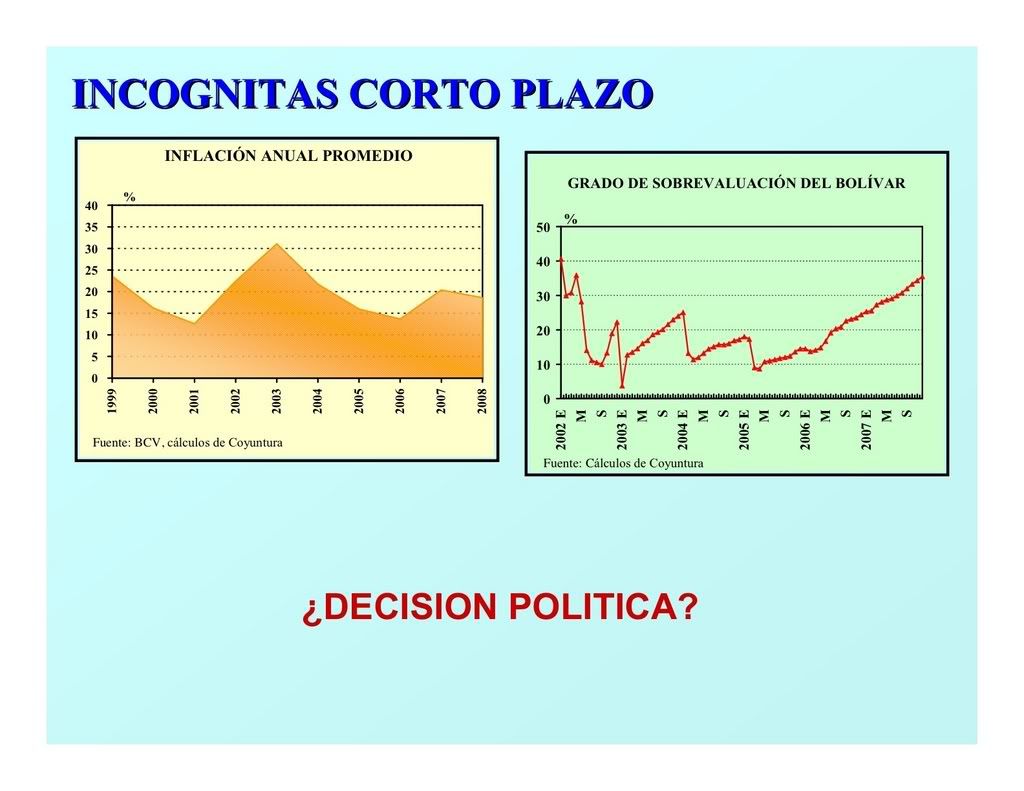
The graph on the right shows one economic analysis firm's calculations of how over valued the Venezuelan currency is. The sharp drops are where the Bolivar was devalued, though even during those times they still considered it overvalued. The increases come when the fixed exchange rate between the Bolivar and dollar is maintained (as it is right now). As the chart shows the Venezuelan currency has consistently been overvalued, only the extent of its overvaluation has varied between 10% and 40% overvalued.
This may sound like mumbo jumbo and the chart may seem meaningless. But to see that it isn’t refer look at the how the chart on how overvalued the currency is and compare it to Venezuela’s total non-oil exports. Note for example that as the Venezuelan currency became more overvalued during 2006 its non-oil exports dropped!
This is the key point – to boost exports other than just oil Venezuela must make its exports more competitive by making them more competitive. And that is precisely what devaluing the Bolivar will do. It will also reduce imports so that domestic Venezuelan industry will get two boost; one from increased exports and the other from more internal consumption.
Are there downsides to devaluing the currency. Sure. It means Venezuelans won’t be able to consume as many imported goods and may therefore see their standard of living drop to an extent. For example, last year Venezuelans purchased almost 400,000 new automobiles. Most all were either imported or made extensively from imported parts. So they will become more expensive and a lot fewer of them will be sold. All imported goods will experience the same phenomena to a greater or lesser extent.
This makes this makes devaluation politically tricky. It will almost certainly be unpopular at least in the short term. However, that is the short term pain that must be endured if Venezuela is to move forward. Yes people will have less for a time (though it is mainly middle class people who consume the imported items likely to be affected and they are largely anti-Chavez to begin with). But longer term there will be more industry, more exports, more jobs, and a higher standard of living. The single act of devaluing the currency will do far more to spur Venezuelan industry than the newly announced Fabrica Adentro program. In fact, with out a devaluation Fabrica Adentro is doomed to failure as Venezuela will import more and export less manufactured goods.
Having just passed through an important election cycle this is the perfect time for the government to do the right thing even if it causes some short term pain. This truly is a case of if not now, when. We are already 5 months into 2007 and if much more time goes by “when” will sadly start to look like “never”.
|
However, it needs to be kept in mind that Venezuela is still an underdeveloped and poor country. Most Venezuelans have a low standard of living and there is a significant percentage living in poverty. The Venezuelan economy would probably have to grow another 300% or more before most Venezuelans would enjoy what most of us would consider a good standard of living. Given that to date under Chavez the economy has grown a cumulative 25% or 30% we can see Venezuela has a long, long ways to go.
Further, if Venezuela is to make further gains the next stage of its development will be different from what has occurred up to this point. Venezuela’s economic improvements during the first eight years of Chavez’s rule have come from 1) a successful policy of supporting OPEC and helping to maximize oil revenues and 2) a more equitable distribution of Venezuela’s wealth.
As successful as this line of development has been it has likely reached its maximum extent. That is, while these gains in Venezuela’s standard of living can hopefully be held on to it is unlikely, in my view, that Venezuela’s standard of living can be improved much more by simply selling natural resources. All of Venezuela’s oil income currently comes to little more than $5 per person per day – hardly what most people would want to live on. The prospect of oil going up still more in price such that the $5 would become even $10 is probably dim – and in any event it certainly isn’t something that can be counted on.
This leads to the uncontroversial point that Venezuela needs to move beyond selling oil and greatly expand other types of exports. For Venezuelans to ever have a decent standard of living in addition to exporting $50 billion worth of oil they also need to be also exporting a hundred or two hundred billion dollars of other goods.
I say this is an uncontroversial point because most everyone across the political spectrum, from the opposition to Chavistas, recognizes it. Yet, as much as this may be recognized and paid lip service to by everyone no-one has been successful in increasing non-oil exports – and Chavez is no exception to this poor performance.
This is illustrated by the following graph of non-oil exports:

The tan bars show total Venezuelan non-oil exports. What is notable is that they haven’t changed very much over time. They were about $7.5 billion before Chavez came to office and they were about $8.75 billion last year (as a frame of reference oil exports last year were $58 billion). In relation to the size of the economy and Venezuela’s population this is almost unchanged. The blue bars show the portion of the non-oil exports that are by government owned industries and the red bars show non-oil exports by private industry.
If Chavez has had as his goal increasing non-oil exports he certainly hasn’t been very successful. [Parenthetically, it should be noted that the opposition did no better and that their whining about Venezuela being so heavily dependant on oil revenues is just cheap propaganda]. The question is why have non-oil exports been stagnant?
There is more than one reason why but among the most important, if not THE most important, is that Venezuela has historically kept its currency very overvalued. Its oil revenues have allowed it to keep its exchange rate fixed at a high level and this adversely effects most non-oil industries in a phenomena known as the Dutch Disease.
Why does having an overvalued currency hurt exports and domestic industry in general? Simple. It makes imports cheaper so that Venezuelans will tend to purchase more foreign goods than domestic ones. If 2,000 Bolivares buys a dollar then a $50 imported pair of jeans will cost 100,000 Bolivares. If a lot of Venezuelan’s have 100,000 bolivares to spend on jeans then they may well buy the imported pair. However, if it takes 4,000 Bolivares to get a dollar (from the Bolivar being devalued) that same pair of jeans will then cost 200,000 Bolivares which will lead to fewer Venezuelans wanting imported jeans. They will instead find Venezuelan made jeans cheaper and will be more likely to buy them.
The same goes for exports - the less valuable the Bolivar is relative to the dollar the cheaper Venezuelan goods will be to people in other countries and this will serve to boost Venezuelan exports.
Knowing that a strong currency tends to increase imports and stymie exports we can now look at a graph that will speak to why Venezuelan non-oil exports haven’t grown:

The graph on the right shows one economic analysis firm's calculations of how over valued the Venezuelan currency is. The sharp drops are where the Bolivar was devalued, though even during those times they still considered it overvalued. The increases come when the fixed exchange rate between the Bolivar and dollar is maintained (as it is right now). As the chart shows the Venezuelan currency has consistently been overvalued, only the extent of its overvaluation has varied between 10% and 40% overvalued.
This may sound like mumbo jumbo and the chart may seem meaningless. But to see that it isn’t refer look at the how the chart on how overvalued the currency is and compare it to Venezuela’s total non-oil exports. Note for example that as the Venezuelan currency became more overvalued during 2006 its non-oil exports dropped!
This is the key point – to boost exports other than just oil Venezuela must make its exports more competitive by making them more competitive. And that is precisely what devaluing the Bolivar will do. It will also reduce imports so that domestic Venezuelan industry will get two boost; one from increased exports and the other from more internal consumption.
Are there downsides to devaluing the currency. Sure. It means Venezuelans won’t be able to consume as many imported goods and may therefore see their standard of living drop to an extent. For example, last year Venezuelans purchased almost 400,000 new automobiles. Most all were either imported or made extensively from imported parts. So they will become more expensive and a lot fewer of them will be sold. All imported goods will experience the same phenomena to a greater or lesser extent.
This makes this makes devaluation politically tricky. It will almost certainly be unpopular at least in the short term. However, that is the short term pain that must be endured if Venezuela is to move forward. Yes people will have less for a time (though it is mainly middle class people who consume the imported items likely to be affected and they are largely anti-Chavez to begin with). But longer term there will be more industry, more exports, more jobs, and a higher standard of living. The single act of devaluing the currency will do far more to spur Venezuelan industry than the newly announced Fabrica Adentro program. In fact, with out a devaluation Fabrica Adentro is doomed to failure as Venezuela will import more and export less manufactured goods.
Having just passed through an important election cycle this is the perfect time for the government to do the right thing even if it causes some short term pain. This truly is a case of if not now, when. We are already 5 months into 2007 and if much more time goes by “when” will sadly start to look like “never”.
|
